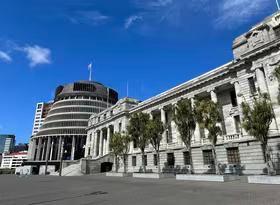Articles
The verdict is in for the Reserve Bank: the weight of evidence against it from economists, financial markets, businesses, and broader public opinion left the Bank with little choice but to retract its May Monetary Policy Statement and effectively plead guilty to previously misreading the economy. Read
In the wake of the Reserve Bank’s May Monetary Policy Statement, Infometrics has pushed back our expected timing of the first official cash rate (OCR) cut from November 2024 to February 2025. Although we don’t think a further delay in beginning to cut the OCR is necessarily the right move, the Bank’... Read
Rapid and widespread inflation, caused by supply-chain issues during the pandemic and higher demand for goods and services as interest rates fell, has clobbered the global economy over the last three years. Resulting interest rate rises to help get inflation under control have further challenged eco... Read
In New Zealand’s laissez-faire economy, there are two main institutions with the ability to have a significant effect on economic outcomes. One of those institutions, the Reserve Bank, attracts plenty of attention and generates its fair share of column-inches with its monetary policy decisions. But it’s debatable ... Read
On Tuesday, Reserve Bank Chief Economist Paul Conway will deliver a speech on how the global economy has changed since the Covid pandemic, and the role of more frequent and accurate data to inform monetary policy decisions. Unusually, though, the speech will include “brief comments on domestic data developments” since the Bank’s last Monetary Policy Statement in November. Read
There are increasing questions being raised in the provinces about how hard the hit to the primary sector, and by extension the broader New Zealand economy, might be from lower export prices. That mounting risk represents a shift in focus from higher interest rates, which have dominated the discussion about factors weighing on the economy over the last two years, as the official cash rate has been ramped up from 0.25% to 5.5% and mortgage rates have hit a 14-year high. Higher fuel prices are adding to economic challenges, costing families more and raising the cost of moving goods around. Read
There’s little doubt the housing market has started to come back to life over the last few months. In this article, we examine the indicators showing the market’s pick-up and what’s been driving that recovery. We also look at how pronounced and persistent the pick-up might be, and we explore the implications for future monetary policy settings and residential construction activity. Read
There’s no expectation that the Reserve Bank will change the official cash rate (OCR) at this week’s Monetary Policy Review, especially given that it takes place just 10 days out from the election. The Bank hasn’t changed the OCR at the last review before an election since 2008, when the Global Financial Crisis was a far bigger issue than worries that a shift in monetary conditions might change voters’ minds one way or the other. Read
Has the Reserve Bank done enough in its battle to bring inflation back under control? Data over the last month has been inconclusive about whether demand is softening sufficiently to limit the ability to raise prices at pace. Headline inflation has been trending in the right direction since the end of last year, easing from 7.2% to 6.0%pa, but prices are still increasing at twice the rate the Bank is aiming for. And there must still be concerns that the tail of domestic price pressures is going to hang around for some time yet. Read
“You change your mind like a girl changes clothes” – Katy Perry’s hit song might as well have been about Adrian Orr and the Monetary Policy Committee. Throughout this year, the Reserve Bank’s official cash rate (OCR) decisions have created uncertainty in financial markets as the tone of the statements has continually jumped between tough-talking and relaxed. This week, based on the Bank’s last forecasts published in May and most economic data to hand, everybody’s expecting the OCR to stay on hold. But are we about to be surprised again? Read









